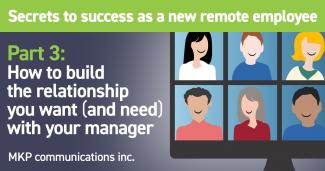
Secrets to success as a new remote employee – Part 3: How to build the relationship you want (and need) with your manager
By Cathy Planchart, Senior Project Manager
As you know if you read part 1 and part 2 of this blog series, I recently transitioned from working in my local community of Hancock County, Maine, to working remotely with MKP communications inc., a company based in New York City. For the last 30 years, I have worked in traditional, in-person office environments where I had an office or cubicle and co-workers in close physical proximity. In this environment it was easy to get facetime (note all lower case) with my manager, interact with co-workers on both a personal and professional level, lead meetings around conference room tables where every seat was filled, etc.
So, how do you build relationships with your manager when you work remotely? How do you make yourself get recognized for your good work in hopes of getting a raise or a promotion?
As a remote employee, sometimes I experience feelings of isolation and disconnection. I don’t want to bother my co-workers or manager because I don’t know if they are busy, in a meeting, on the phone or out of the office. In a traditional in-person office environment, I could just walk down the hall to see if co-workers are available. But now the only visual I have on them is when we are in a video meeting. So, rather than feeling isolated and stymied, I have become proactive in connecting and communicating, especially with my manager, by doing the following things:
- I ask my manager for help and advice when needed, reminding myself that my manager is invested in my success and there is no such thing as a stupid question.
- Rather than sending a question via email, which may not get a quick response, I call or text my manager. At MKP, we share our personal cell phone numbers and encourage calls and texts. Other companies may use an online chat application. But nothing beats face-to-face communication, so at MKP we often jump onto Teams for a quick video chat.
- Keeping my manager informed about the work I am doing helps build trust. Managers are most concerned about productivity and getting things done, so maintaining open lines of communication is critical. At MKP, every Friday I deliver to my manager a “to do” list for the upcoming week.
- Establishing a routine one-on-one meeting with my manager has been very effective. It can be once a week or every other week, but it is a set recurring meeting at the same day/time. This provides an opportunity for me to share my accomplishments (and be recognized for the good work I am doing), what I will be working on and discuss any areas where I am having difficulty. For my manager, it is an opportunity to provide feedback and direction.
- If my manager has not scheduled a 90-day review with me, I ask for one. I have found there is much to be gained as a new employee by checking in at this milestone, and it is even more important as a remote employee. I come prepared with a list of successes, questions I have and maybe even a few suggestions on how things might be improved. In these review meetings, managers can discuss an employee’s progress to date based on their expectations, share what is going well and provide constructive feedback on areas for improvement. This early check-in helps me adjust my work style, which positions me for future success.
By taking responsibility for building an effective working relationship with my manager, I can create the type of relationship I want. Again, nothing shared here is reserved only for remote employees. These tactics are equally effective for employees operating in traditional, in-person office environments. But, taking the initiative to create and nurture the employee-manager relationship you want (and need) is, arguably, even more important for success as a remote employee.
(If you haven’t yet done so, please read part 1 and part 2 of this blog series!)
MKP communications inc. is a New-York based marketing communications agency specializing in merger/change communications for the financial services industry.